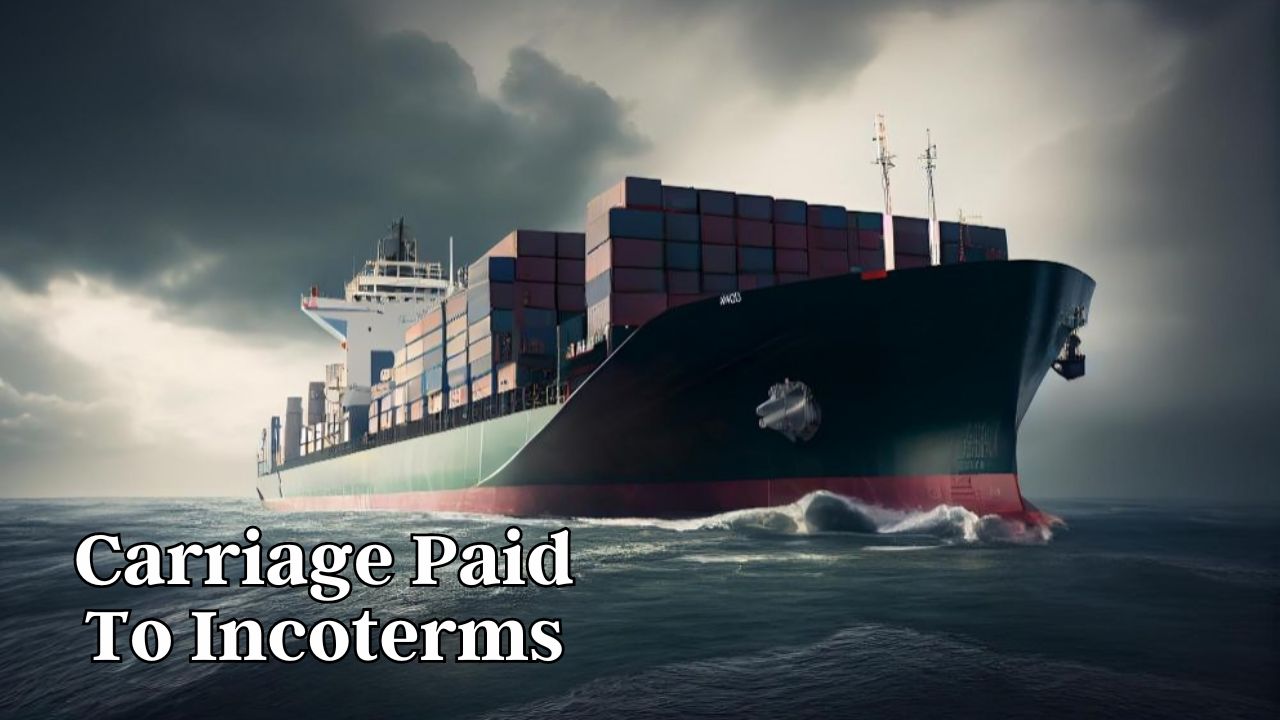If you are an importer or exporter, it is crucial to understand the various Incoterms used in international trade. One such term is “Carriage Paid To” (CPT), which defines the shipping arrangements between the buyer and the seller. In this context, it is essential to have a practical guide that can help you navigate the complexities of CPT and other Incoterms.

| Table of Content |
What is Carriage Paid To (CPT)?
This is a comprehensive guide that can assist you in understanding the importance of CPT and its implications for your business. This guide will ensure that you thoroughly understand CPT and can make informed decisions about your shipping arrangements.
Carriage Paid To (CPT) is a popular trade term used in international trade to refer to the responsibilities and obligations of both the buyer & the seller. In simple terms, CPT means that the seller is responsible for the cost of transporting the goods to the agreed destination, including arranging and paying for the shipment, customs clearance, and any other charges associated with the delivery of the goods.
As per the established agreement, the seller must ensure that the goods are protected against any potential damage or loss during transit. Upon the safe arrival of the goods at the agreed destination, the buyer must take possession of the goods and assume any further associated costs and risks. This approach ensures that both parties are protected and the transaction will be completed seamlessly.
CPT simplifies the shipping process for a buyer or seller in international trade. You can also work with a trusted shipping partner or freight forwarder to ensure a smooth and successful transaction.
Example of Carriage Paid to Incoterms

Carriage Paid To (CPT) is a crucial Incoterm in international trade. It defines the seller’s responsibility for the goods until they are delivered to the carrier or the port of shipment. For instance, let’s take the example of a Chinese electronics firm exporting goods to a US-based customer. If you choose CPT, the seller assumes responsibility for all costs related to delivering the goods to the carrier or the nominated place of delivery, including transport costs, export clearance, and other charges incurred up to that point.
Once the goods are loaded onto the vessel, the seller’s responsibility ends, and the buyer’s responsibility begins. The buyer takes over from this point and is responsible for all costs and risks associated with the shipment, including transportation costs from the port of arrival to the final destination, import duties, taxes, and other charges incurred.
This way, both parties have a clear understanding of their responsibilities and the costs associated with the transaction. This helps avoid disputes and misunderstandings while ensuring a smooth and efficient transaction. Moreover, it provides clarity on the delivery and costs incurred, eliminating any confusion between the two parties.
Pros and Cons of Carriage Paid To (CPT)

Pros
While there are several advantages of using CPT, there are also a few disadvantages that businesses should keep in mind. Let’s discuss the pros and cons of CPT in more detail.
Here are some pros of CPT:
Simplifies the Shipping Process
One of the most significant advantages of CPT is that it simplifies the shipping process for both the buyer and the seller. Since the seller is responsible for arranging the transportation and shipping, it saves the buyer time and effort in finding a reliable carrier.
Cost-Effective
CPT is a cost-effective shipping method for businesses that do not have their transportation infrastructure. Since the seller is responsible for transportation costs, the buyer does not have to worry about additional expenses.
Reduces Risk
CPT reduces the risk for the buyer since the seller is responsible for the timely delivery of the goods to the destination. This is particularly beneficial for businesses that deal with high-value products or fragile goods.
Ensures Transparency
This method ensures transparency in shipping costs, as the seller must disclose all transportation-related expenses to the buyer. Plus, it makes it easier for buyers to budget and plan their expenses.
Provides Security
When it comes to high-value goods or sensitive information, security is a top priority. Luckily, with CPT, buyers can rest easy knowing that the seller is highly responsible for insuring the goods during transportation.
Improves Business Relationships
By using CPT, both parties can establish a more substantial business relationship as they work together to ensure the delivery of the goods. This can lead to repeat business and long-term partnerships.
Reduces Liability
Under the CPT incoterms, the seller bears the responsibility for the goods during transportation, significantly reducing the buyer’s liability. This is especially advantageous for businesses that lack the resources to handle potential issues or complications during shipping.
Cons
Here are some potential cons of CPT incoterms:
Limited Control Over Shipping
One of the most significant disadvantages of CPT is that the buyer has limited control over the shipping process. Since the seller is responsible for arranging transportation, the buyer may not have much say in the choice of carrier or shipping method.
Risk of Damage
Although the seller is responsible for insuring the goods during transportation, there is still a risk of damage or loss during shipping. This can be particularly problematic if the goods are high-value or irreplaceable.
Delays in Delivery
CPT can be subject to delays in delivery due to factors beyond the seller’s control, such as customs clearance or transportation strikes. This can be particularly frustrating for businesses that require timely delivery of their goods.
Additional Expenses
While CPT can be cost-effective in some cases, there may be additional expenses that the buyer did not anticipate, such as customs duties or taxes. This can increase the overall cost of the transaction.
FAQs
Here are some FRQs related to Carriage Paid to Incoterm and topics related to it that you might be curious about:
What Is the Difference Between CPT and CIF?
When it comes to international trade, understanding the various Incoterms is crucial for successful transactions. Two commonly used terms are CPT and CIF, and it’s essential to differentiate between the two. CPT stands for Carriage Paid To, which means the seller is responsible for all the responsibilities that may occur during the shipping of the goods.
On the other hand, CIF stands for Cost, Insurance, and Freight. With this term, the seller is responsible for delivering the goods to the destination port, paying for the transportation costs, and insuring the goods. The main difference between CPT and CIF is who is responsible for insuring the goods.
What Is the Difference Between CPT and DDP?
Understanding the difference between CPT and DDP is imperative in international trade. CPT means the seller covers transport costs to a specific destination, while DDP entails the seller taking care of all import duties and taxes. This knowledge empowers both parties to make informed decisions and avoid potential miscommunications. So, whether you’re a buyer or a seller, take the time to educate yourself on these two trade terms to ensure a smooth and successful transaction.
Wrapping it Up!
Importing and exporting goods internationally can be a daunting task, but understanding the Carriage Paid To incoterms can make it easier. To ensure a smooth and hassle-free shipping experience, it’s crucial to use a reliable and efficient shipping service that offers the best rates for both standard and express shipping. NextSmartShip is a trusted shipping partner that guarantees timely and secure delivery of your goods. So why wait? Choose NextSmartShip for your next shipment and experience the benefits for yourself.

